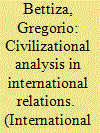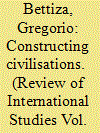|
|
|
Sort Order |
|
|
|
Items / Page
|
|
|
|
|
|
|
| Srl | Item |
| 1 |
ID:
130927


|
|
|
|
|
| Publication |
2014.
|
| Summary/Abstract |
This article maps and develops-theoretically and empirically-the field of civilizational analysis in international relations (IR). In particular, it teases out a more explicit "civilizational politics" line of research, which builds upon latent and underdeveloped themes in the civilizational turn in IR. "Civilizational politics" offers an avenue for theoretically inclined, empirically minded scholars to explore how social and political actors have come to understand, change, and construct world politics as if plural civilizations existed and their relations mattered. The article anchors "civilizational politics" research to a modernist-constructivist approach to IR and structures it around two key steps. The first step is to recover and interpret subjective and intersubjective meanings through participants' discourse. The article proposes an understanding of civilizations as "imagined communities" narrated by political and intellectual elites: as essentialized or non-essentialized entities; and as clashing/conflicting or dialoguing/engaging with each other. The second step outlines three causal pathways that explain how narrated civilizational imaginaries affect world politics and turn civilizations into social facts: by guiding and structuring social action; by shaping and becoming embedded in formal institutions and patterned practices; and by bestowing recognition and socially empowering actors claiming to speak for civilizations. The empirical import of a "civilizational politics" line of research is demonstrated through a re-reading of Turan Kayao?lu's article "Constructing the Dialogue of Civilizations in World Politics: A Case of Global Islamic Activism."
|
|
|
|
|
|
|
|
|
|
|
|
|
|
|
|
| 2 |
ID:
139591


|
|
|
|
|
| Summary/Abstract |
Since 11 September 2001, the ‘Muslim world’ has become a novel religio-culturally defined civilisational frame of reference around which American foreign policy has been partly reoriented and reorganised. In parallel, the ‘Muslim world’, is increasingly becoming, at this historical juncture, a civilisational social fact in international politics by being progressively embedded in, and enacted onto the world by, American foreign policy discourses, institutions, practices, and processes of self-other recognition. This article theoretically understands and explains the causes and consequences of these changes through an engagement with the emerging post-essentialist civilisational analysis turn in International Relations (IR). In particular, the article furthers a constructivist civilisational politics approach that is theoretically, empirically, and methodologically oriented towards recovering and explaining how actors are interpreting, constructing, and reproducing – in this case through particular American foreign policy changes – an international society where intra- and inter-civilisational relations ‘matter’.
|
|
|
|
|
|
|
|
|
|
|
|
|
|
|
|
| 3 |
ID:
169258


|
|
|
|
|
| Summary/Abstract |
The study of religion and international religions has witnessed an exponential growth in recent decades. Courses and programs exploring the complex entanglements between faith and global politics have likewise mushroomed around the world. Despite this ferment, reflections on teaching religion and international relations have so far lagged behind. This forum seeks to remedy this general silence. It brings together a diverse range of scholars from a multiplicity of national, religious, methodological, and theoretical backgrounds who teach across a variety of different geographical settings including North America, Europe, and East Asia. Contributors reflect on three broad themes. First, how do we engage with the contested character of religion as a category of analysis and practice, and with the multidisciplinary nature of its study? Second, how does the context within which we operate—be it geographical, cultural, institutional, or historical—influence and shape who, what, and how we teach? Third, how do we address the important and, at times, contentious personal and ethical challenges that our research and teaching on religion and politics inevitably raises in the classroom?
|
|
|
|
|
|
|
|
|
|
|
|
|
|
|
|
|
|
|
|
|